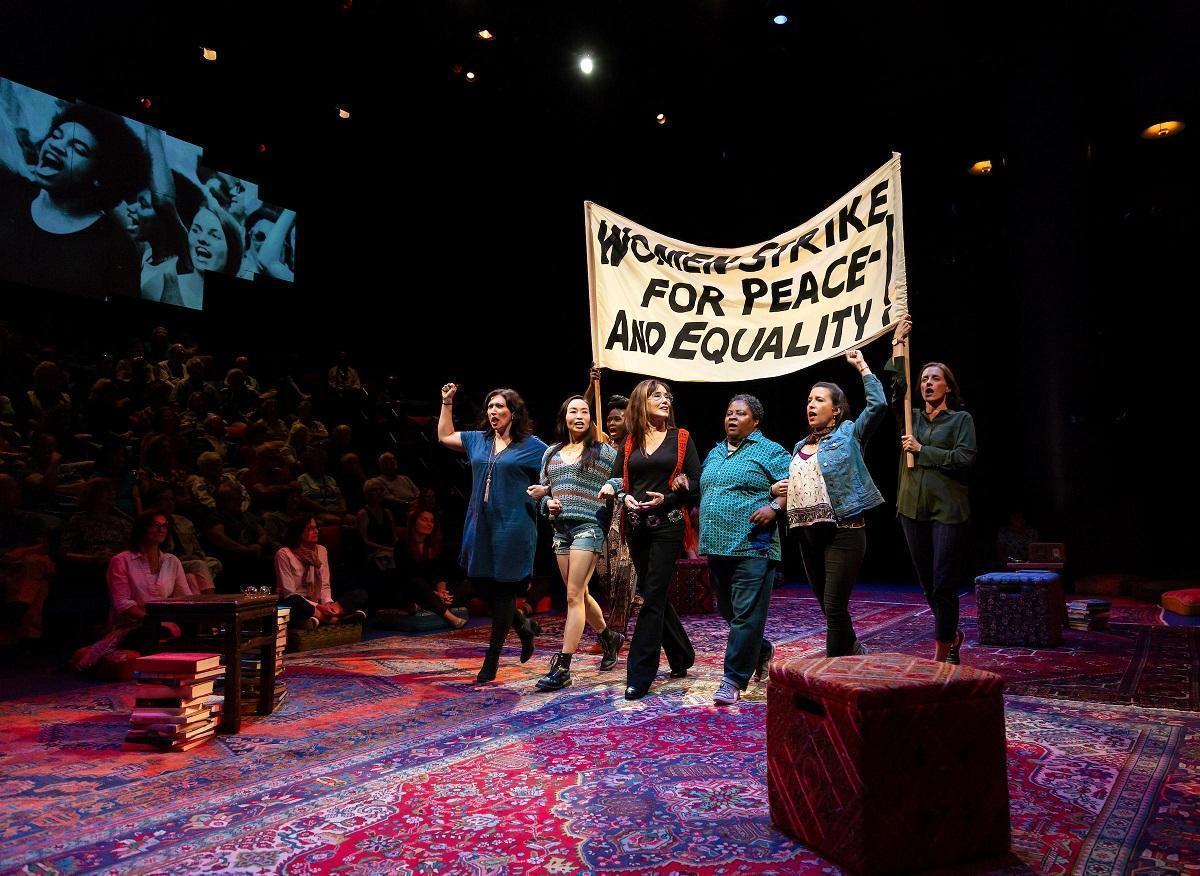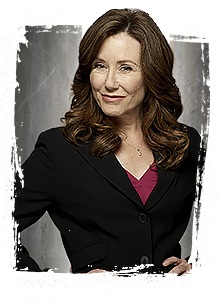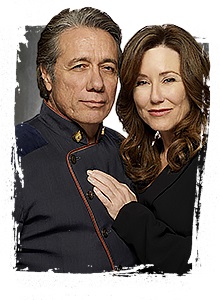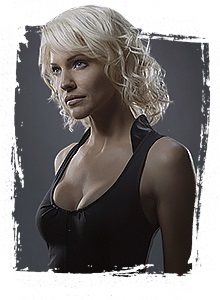
McCarter Theater Review: ‘Gloria: A Life’
Neal Zoren
September 18, 2019

Emily Mann’s “Gloria: A Life” has so many intersecting and overlapping facets, the play, also directed by Mann for Princeton’s McCarter Theater, needs to be reviewed from several perspectives, as if it were a cubist painting.
Let’s start with the piece’s structure, a work of genius on Mann’s part.
The Gloria whose life is examined is Gloria Steinem, who first established a reputation in the silent, lonesome profession of writing but made her name as a firebrand speaker, rallier, lobbyist, and spokeswoman for Women’s Liberation.
Mann, charged with blending biography with achievement, takes a mostly linear approach but jettisons the standard narrative for a tone and atmosphere that comes straight from Steinem’s milieu. The overall impression is of series of gatherings, from intimate circle caucuses to full-blown demonstrations, in which Steinem hones and delivers her rhetoric while speaking, between slogans and aphorisms, about how she arrived to some of her conclusions and how experience deepened and sharpened her message.
It’s a remarkable feat, exposing the life, thoughts, and public evolution of a known figure in the exact style that generated that figure’s fame.
We see Steinem as we remember her, tying complex thoughts into four-word phrases, motivating women and others seeking redress from undue restraint and authority with rousing speeches, and employing style and wit many of her colleagues lacked or eschewed as immaterial.
Steinem, portrayed by the inviting, involving Mary McDonnell, is present in all of her liveliness and immediacy. The McCarter audience is often treated as a Steinem audience, prompted to applaud and show cheering approval. The magic part about this is the shilling never irritates. Steinem, via McDonnell, rouses folks, gets their juices going, starts their minds racing, and earns the effect that, in many circumstances, would backfire by seeming thick or coercive.
Steinem/McDonnell — they become interchangeable — state that a purpose of “Gloria: A Life” is to provoke thought and conversation for days, and my bet is they’ll succeed. (The person I saw it with called me twice the next day with revelations and points of insight that continued a conversation that began at show’s end and lasted through an ice cream stop and a 35-mile ride home.)
McDonnell puts a charge in McCarter’s air. She and six castmates create both energy and controversy. The challenges, ideas, and calls for action Steinem brings forth create excitement bordering on electricity whether you agree with everything spouted or not.
Rhetoric is another of the facets.
“Gloria: A Life” reveals a lot. Facts and statistics are bruited as often as opinions, sometimes to provide information or shore up opinions. The relationship between women’s issues and those of minorities, particularly female minorities, Native Americans, and immigrants is clearly and frequently made. Mann and Steinem are both intent on stating that social subjugation and the denial of equality do not operate in a vacuum or touch a single segment of the populace.
Their arguments are interesting, at times arresting. Mann even finds ways to vary issues so all complaints and proposed solutions do not sound the same.
The rhetoric plays for the duration of the piece. Momentum and a perceptible audience will to support Steinem give her points of view the field — and the day.
A downside of that is facts may be cut-and-dried, but what they mean to individuals might not be. An idea that is rational in some contexts could have tentacles that require subtlety or expanded discussion to cover every aspect.
“Gloria: A Life” assumes agreement. It declares more than it couches things in “I’m Gloria Steinem, and this is what I personally think.”
From the idea of presenting a biography in which Gloria Steinem is the subject, this makes dramatic sense.
At times, though, Mann comes off as being just as much an advocate as she is a playwright. Her piece leaves little breathing room for attitudes of “not so far,” “not so fast,” or “that isn’t the only consideration or the entire story.”
Watching “Gloria: A Life,” the tendency is to be so caught up in Steinem’s logic and the sincere crusade she wages, it seems small to withhold applause or radical to shake your head “no” at a Steinem maxim, but “Gloria’s” truth is not everyone’s truth or belief, even if one would not go as far as the depicted Phyllis Schlafly or some callers Steinem endures while on live radio and TV to voice their disdain. It’s Steinem speaking as Steinem, so it’s plausible to have a sense of absolutism prevail. That may excuse, but it doesn’t totally relieve occasional feelings that force-feeding is afoot.
Theatricality is non-stop and abundant. Perfectly chosen projections underscore and illustrate the stadium feeling McDonnell and company create on stage. Mann, as director, has provided much for the eye and ear to take in. Her production moves as much as it is moving.
“Gloria: A Life” has no firm intermission, but it has a “second act,” in which people from the audience become a circle caucus and offer personal stories that expound on what they heard and saw. On opening night, the scripted section was stronger, but some stray comments from the house hit home.
Mary McDonnell is wonderful as Steinem, exuding Steinem’s intellect and the enthusiasm. She is abetted by six who play dozens of characters: Patrena Murray, Brenda Withers, Gabrielle Beckford, Mierke Girten, Erika Stone, and Eunice Wong. Murray is a constant conscience for the piece, Girten a hilarious Bella Abzug, and Stone an inspiring Wilma Mankiller. Beautiful rugs and chests assembled by set designer Amy C. Rubin and perfect costumes by Jessica Jahn enhance Mann’s production.











